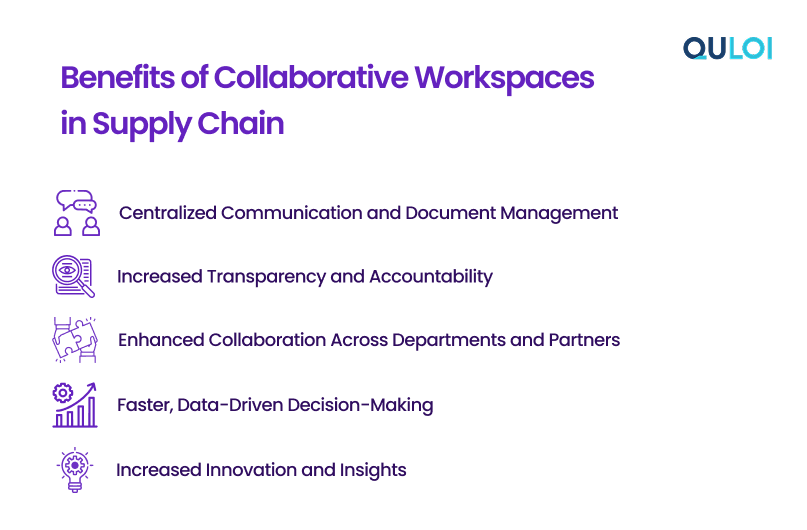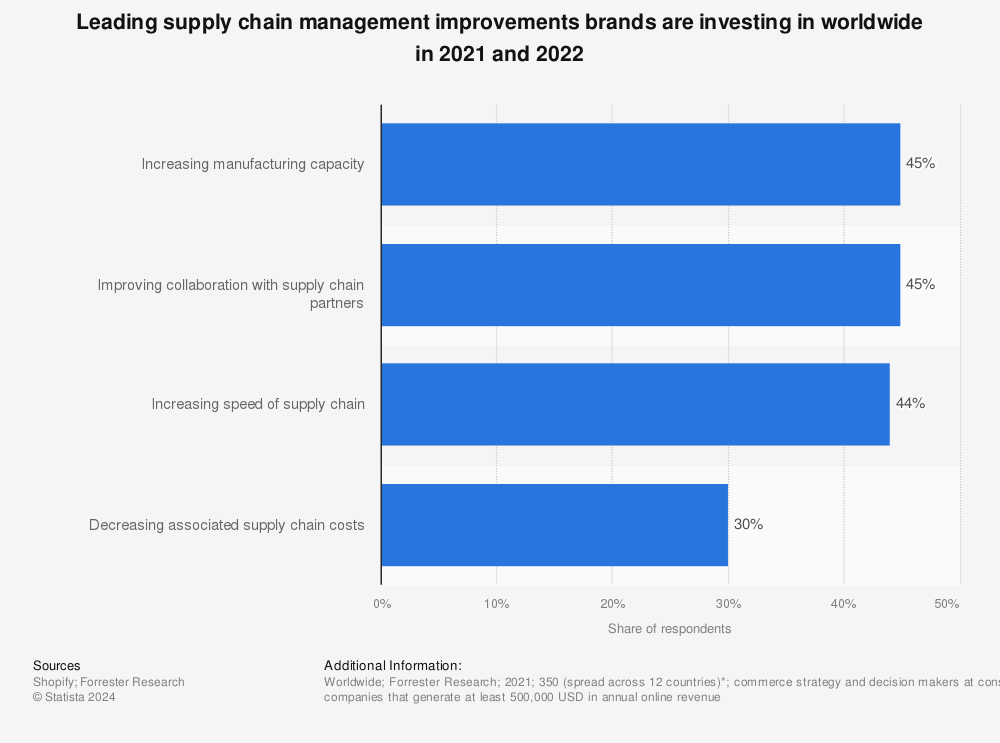Shared Workspaces: Why You Need Them in Supply Chain Collaboration
This article unpacks why shared workspaces are essential for modern supply chains, how they accelerate approvals and decision-making, and highlights how Quloi’s platform is at the forefront of this transformation.
The Case for Ditching Email Threads and Siloed Tools
Traditional Communication: Email remains the default mode of communication for supply chain stakeholders but it is inherently fragmented and siloed. Important information is buried in long email threads, attachments go missing, and there is no single source of truth. Further, siloed tools like spreadsheets, disconnected ERPs, and standalone procurement platforms – fragment data, making real-time updates accessibility difficult and effective collaboration a big deal.
Fragmented Collaboration: Disconnected platforms slow down approvals, increase miscommunication risks, and make it difficult to proactively respond to evolving market scenarios. Top-performing supply chains excel through real-time visibility and cross-functional teamwork, while those relying on disconnected systems face errors, delays, and missed sales opportunities. Gartner research stated that 83% of businesses prioritize customer experience in their digital supply chain strategies, understanding the significance of collaboration to meet customer needs and maintaining competitiveness.
How Shared Workspaces Accelerate Decision-Making
Centralized Communication and Document Management: Shared workspaces enable a single, secure, and unified hub for all supply chain communications, documents, and workflows. This eliminates information siloes and improves visibility, ensuring everyone is accessing the same, up-to-date information. Real-time notifications and automated task assignments ensure fast approvals and response processes, with stakeholders taking complete ownership and accountability.
Data-Driven Decision-Making: With all relevant data, documents, and communications in a centralized location, in a single repository, stakeholders can make informed decisions faster. Shared workspaces often integrate with reporting and analytics tools, offering actionable insights into purchase order status, supplier performance, and potential risks. AI-driven features like smart virtual assistants can automate routine tasks, anticipate disruptions, and flag exceptions further accelerating the decision-making process.

How Shared Workspaces Accelerate Decision-Making
Cross-Departmental Collaboration: Modern supply chains require collaboration between manufacturing, procurement, logistics, and external business partners. Shared workspaces facilitate open communication and break down departmental siloes, enabling real-time collaboration and joint-problem solving. The top factor for successful supply chains is strong collaboration between supply chain teams- possible with integrated digital tools.
Improved Transparency and Accountability: Every action in a shared workspace is tracked and auditable , allowing administrators to track who did what, when, and potentially where. This transparency and visibility builds trust among supply chain partners and supports compliance regulatory needs.
Quloi’s Platform: Powering Supplier and Internal Collaboration
Quloi, a supply chain collaboration platform, is designed to connect suppliers, buyers, logistics providers, and internal stakeholders with a digital workspace. Here’s how Quloi helps companies drive collaboration and efficiency.
Unified Workspaces for Every Stakeholder: Quloi provides dedicated digital workspaces for buyers, suppliers, logistics partners, and customs brokers, ensuring that all parties can collaborate in real-time on orders, shipments, and documentation. Supply chain and logistics partners can access centralized workspaces from anywhere in the world, supporting remote and global teams.
Real-Time Communication and Notifications: The digital platform replaces fragmented email chains with instant messaging, comment threads, and automated notifications. This ensures that important information reaches the right people immediately. Integration with tools Microsoft Teams and Slack bridges communication gaps by allowing users to stay connected within their preferred communication ways.
Automated Workflows and Approvals: Quloi automates routine activities like purchase order approvals, shipment bookings, and document submissions. The digitized process minimizes manual efforts and eliminates bottlenecks. Stakeholders receive real-time alerts and notifications when their input is required. This accelerates the approval cycles through a single click – significantly cutting lead times.
Centralized Document and Data Management: Quloi enables a centralized platform for stakeholders to store and manage all documents – invoices, contracts, certifications, and more in a secure way with document version control. The centralized repository ensures that everyone is working on/from the latest documents and meets compliance requirements.
Supplier Collaboration and Performance Tracking: Quloi’s supplier management platform allows suppliers to self-register, upload documents, and communicate directly with buyers, streamlining supplier onboarding and improving multi-tier collaboration. The platform tracks performance metrics such as on-time delivery, product quality, cost, compliance, and innovation. This assessment promotes transparency and open communication, enabling data-driven supplier development.
Real-Time Visibility and Analytics: Dashboards provide actionable insights into order status, shipment tracking, and supplier performance, supporting proactive decision-making. 63% of organizations have implemented technological solutions to assess supply chain efficiency, emphasizing on real-time analytics and collaboration. AI-powered analytics help assess risks, forecast potential disruptions, and suggest corrective measures.
The Business Impact: Real Results from Shared Workspaces
Faster Approvals and Reduced Cycle Times: Organizations leveraging supply chain platforms claim up to 30% reduction in procurement cycle times and 20% faster supplier onboarding compared to those using lengthy emails and spreadsheets. Real-time collaboration enables stakeholders to communicate openly and respond to market changes and disruptions with agility.
Improved Supplier Relationships and Performance: Centralized communication and transparent performance tracking foster collaborative relationships with suppliers, leading to improved product/service quality and reliability. A survey reports that 45% of brands are expanding their manufacturing operations and improving collaboration to address supply chain challenges effectively.

Greater Resilience and Risk Management: Integrated digital platforms and shared workspaces improve multi-tier supply chain visibility, allowing stakeholders to identify risks at an early stage and respond faster to disruptions. As global disruptions continue to impact the supply chain, the Quloi platform provides complete end-to-end visibility and agility needed to build resilient, future-ready supply chains and boost customer satisfaction.
Conclusion: Collaboration As Competitive Advantage
In 2025 and beyond, collaboration is not just making headlines – organizations find it a new currency of supply chain success. The shift to integrated and digital workspaces has been transforming how organizations communicate, make decisions, and respond to unprecedented challenges. By ditching email threads and siloed tools and adapting unified platforms, organizations are finding ways to offer a data-driven pathway for strengthening team dynamics and supply chain performance. Quloi offers a unified platform for organizations to accelerate approvals, improve supplier relationships, and build agile, resilient supply chains by transforming collaboration into a disciplined practice.
The end goal is simple: better and informed decisions, fewer results, and optimized outcomes. If your set goals look like this, Quloi is ready to help you achieve those goals. Contact us to leverage real-time data and foster true partnerships across every link in your supply chain.
Book a free DEMO today to harness full potential of Quloi’s supply chain and logistics platform and secure its competitive advantages in interconnected world economy.